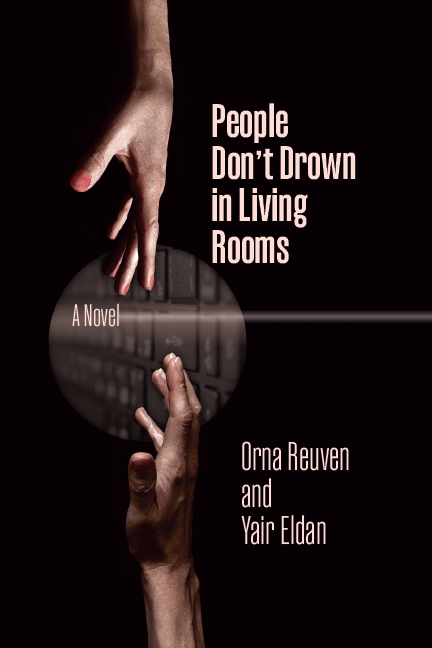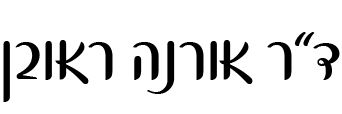Ella, a psychologist living in Tel Aviv, receives a surprising email from her former patient, Itamar. Itamar’s email marks the beginning of a tumultuous correspondence that traverses the distance from Tel Aviv to New York and explores the boundaries of their relationship. When Itamar reveals he is hiding from authorities and asks Ella for money, the seemingly guarded and level-headed psychologist travels to New York to meet him. As the plot unravels and emotional turmoil sets in, the defined boundaries between psychologist and patient are challenged as both try to bridge the gulf between them, in an attempt to find a common ground of sane understanding.
Written in the form of a modern epistolary novel, the email correspondence between Ella and Itamar, People Don’t Drown in Living Rooms spins the tale of a psychologist and patient caught in an impossible situation, raising the everlasting question about the essence of psychotherapy.
This fictional correspondence was written in two voices; Dr. Yair Eldan, a lecturer on law, wrote the voice of Itamar, and Dr. Orna Reuven, a psychoanalyst and psychology lecturer, wrote the voice of Ella.

"An incredibly profound and emotional reading experience!"
Dr. Galit Atlas, psychoanalyst, factuality NYU, an essayist and author
"An engrossing, addictive novel of letters, the reading of which is in itself a roller coaster of identifications, and which manages at the same time to touch deeply on the essence of the analytical relationship and to exceed all its rules and boundaries."
Prof. Dana Amir, a clinical psychologist, supervising and training analyst, poetess and literature researcher
"This book teaches us more about the intensity of the love-hate dynamics that exist between patient and analyst than any journal article on the subject."
Danielle Knafo, professor, psychoanalyst, author
OCD Research
This paper presents the main findings of my Ph.D. dissertation and discusses their application to the treatment of OCD. We explored the central role of control in OCD using an illusion-of-control paradigm and showed that OCD symptoms were correlated with both higher illusory sense of control, and with more repetitive behavioral control attempts. We then conceptualized the dynamics between illusory sense of control and compulsive rituals, suggesting that compulsions serve to deduce control levels by proxy. This happens as the temporary, yet much-desired illusion of control derived from compulsions, becomes a general indicator of control. But what would happen in therapy, if we could address proxies for what they are, and dare think of the true uncontrollability they are hiding?
This paper explored the effect of meta-cognitive manipulation, on the difficulty to suppress repetitive behaviors. Participants were asked to suppress scratching, while working on a questionnaire that presented scratching-related situations. Some participants received a meta-cognitive conceptualization of potential difficulty in executing the suppression task; they were either told that suppressing scratching is quite easy for everybody or told that suppressing scratching is very difficult for everybody. We reasoned that participants would use the meta-cognitive conceptualization to infer their own motivation: those who received the "easy for everybody" instructions would consider their suppression failures to be indicative of their motivation to scratch, and therefore would scratch more. Conversely, participants who received the "difficult for everybody" instructions would consider their suppression failures as natural and non-informative, and consequently would be less motivated to scratch. Results are discussed in a broad therapeutic framework, addressing the importance of interpretations that highlight the natural uncontrollability of the inner world, indicating that control failures are expected and nonindicative. Could this be the reason psychodynamic treatment tends to obtain smaller effects with OCD patients? Afterall, psychodynamic understanding promotes the opposite idea, that difficulty to suppress thoughts and behaviors has a deep motivational explanation that should be revealed.
This paper aimed to compare five principal measures for assessing insight in OCD and to investigate the relationships between insight and central demographic and clinical variables. The most robust correlation was between insight and current medical treatment, so that medicated participants showed higher insight levels on most insight measures compared to non-medicated participants.
This paper implemented an experimental methodology that explores the relations between morality and physical cleansing, to participants with OCD and matched controls. All participants wrote about an immoral deed they had committed, after which half of the participants in each group cleaned their hands with a wipe. All participants were then offered an opportunity to help a fictitious graduate student by taking part in her experiment. Replicating previous findings, physical cleaning reduced the willingness to help and relieved moral emotions, but this effect was particularly prominent among participants with OCD. We discuss two processes that may account for the association between morality and cleanliness in general and particularly in the context of OCD: embodiment of morality in terms of physical cleanliness and assigning abstract meaning to the physical actions of cleaning.
